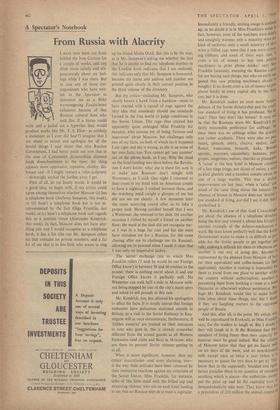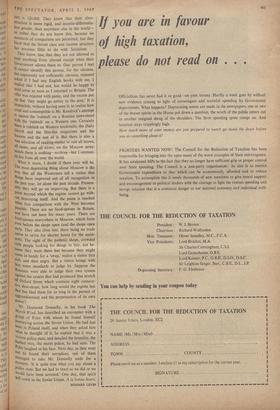A Spectator's Notebook
From Russia with Alacrity
First of all, let me bandy words. It would be a good idea, to begin with, if my critics could agree among themselves whether Moscow (a) has a telephone book (Anthony Sampson, this week), or (b) hasn't a telephone book but is not in- convenienced by the fact (Olga Franklin, last week), or (c) hasn't a telephone book and regards this as a positive virtue (Alexander Kendrick, this week). In fact, Moscow does not have any- thing you and I would recognise as a telephone book; it has a list (the one Mr. Sampson refers io) that contains no private numbers, and a fat lot of use that is to Joe Itzik Who wants to ring up his friend Misha Otzik. But this is by the way, as is Mr. Sampson's asking me whether the fact that he is unable to find my telephone number in the London book indicates that I am enslaved; this indicates only that Mr. Sampson is boss-eyed, because my name and address and number are printed quite clearly in their correct position in the third volume of the directory.
But my critics—excluding Mr. Sampson, who clearly knows a hawk from a handsaw—seem to have reacted with a squeal of rage against the very idea that somebody should use standards formed in the free, world to judge conditions in the Soviet Union. The rage thus created has apparently quite unhinged Miss Franklin for instance, who accuses me of being 'fatuous and inaccurate' about Moscow, but challenges only two of my facts, on both of which (as it happens) I am right and she is wrong, as she is on some of her own facts, too. You cannot get 'any number' out of the phone book, as I say. Why the maid on the hotel landing was there before the Revolu- tion I don't know; what she is there for now is to make sure Russians don't mingle with Westerners, as I said. One night I returned to their room in my hotel with an American couple to have a nightcap. I walked between them, and the watching 'maid caught a glimpse of me but did not see me clearly. A few moments later she came scurrying round after us to take a proper look. Having satisfied herself that I was a Westerner, she returned to her desk. On another occasion I visited by myself a friend on another floor; the maid at the desk did not recognise me: as I was in a huge fur coat and hat she must have mistaken me for a Russian, for she came chasing after me to challenge me (in Russian), allowing me to proceed when I made it clear that I was only an imperialist lackey.
The 'secret' exchange rate to which Miss Franklin refers ('I wish he would let our Foreign Office know') is between 50 and 60 roubles to the pound; there is nothing secret about it and our Foreign Office knows it perfectly well. No Westerner can walk half a mile in Moscow with- out being stopped by one of the city's many spivs and asked to sell pounds at this rate.
Mr. Kendrick, too, has allowed his apologetics to affect his facts. It is simply untrue that foreign embassies have policemen stationed outside in Britain, as a visit to the Soviet Embassy in Ken- sington will at once demonstrate; furthermore, if 'hidden cameras' are trained on their entrances to note who goes in, this is already somewhat different from the armed guards at all Western Embassies (and clubs and flats) in Moscow, who are there to prevent Soviet citizens getting in at all.
What is more significant, however, than my critics' inaccuracies—and more alarming, too— is the way their attitudes have been coloured by their instinctive reactions against my criticisms of the Soviet Union. Miss Franklin, for instance, talks of 'the little maid with the frilled cap and streaming ribbons' who sits on each hotel landing to see that no Russian slips in to meet a capitalist. Immediately a friendly, smiling image is conjured up, as no doubt it is in Miss Franklin's mind. In fact, however, most of the watchers were elderlY and unsightly women; only a minority wore anY kind of uniform; only a small minority of that wore a frilled cap; none that I saw wore straw ing ribbons; and some of them were men. `II costs a lot of money to buy new printing machinery to print phone books,' says Mist Franklin fatuously, excusing the Russian capital for not having such things; but who on earth sug• gested that new printing machinery should he bought'? It no doubt costs a lot of money to print phone books in every capital city in the West' too; but it is done. Mr. Kendrick makes an even more familiar defence of the Soviet dictatorship and the welly low standard of living it has produced. No let' lute? Then they don't like lettuce! It may well be that the Russians share Mr. Kendrick's Pee' fectly reasonable preference for cabbage; hIll since there was no cabbage either the question was rather academic. There were also no peas' beans, spinach, celery, chicory, endive, caul" flower, watercress, broccoli, leeks, Brussels sprouts, marrows, cucumbers, bananas, Peals grapes, tangerines, melons, cherries or gineapP16, A 'salad' at the best hotel in Moscow consisted of a few rings (rings, not slices) of onion, a small pickled gherkin and a tasteless tomato about the size of a large marble. This was a distinct improvement on last year, when a 'salad' colt' sisted of the same thing minus the tomato. The absence of lettuce in Moscow does not 'denote'S low standard of living, nor did I say it did; but it symbolised it.
Mr. Kendrick's use of-that tired Cowardesclilc jest about the absence of a telephone directeni being the first step toward a phone-less Utopia 15 another example of the defence-mechanism at work. He must know perfectly'well that the Soviet Government wants to make it as difficult as Ps: Bible for the Soviet people to get together and talk; making it difficult for them to telephone one another is one way of doing this. Another is represented by the absence from Moscow of bars (or their equivalent) and coffee-houses (or Oleic equivalent). Another is making it impossible for them to travel from one place to another within the country without authorisation; another is preventing them from booking a room at a hotel (Intourist 'or otherwise) without permission. ref' haps Mr. Kendrick would like to make brittle little jokes about these things, too; but I dab; if they are laughing matters to the oppressed people of Russia. And this, after all, is the point. My article may well be reproduced in Krokodil, as Miss Franklin says, for the readers to laugh at. But I doubt ti they will laugh at it. If the Russians find their standard of living funny then their capacity for humour must be great indeed. But the citizens of Moscow. know that they get no liquid mill; on six days of the week, and no non-skin-nue° milk except once or twice a year (when it is necessary to queue for two days to get it). 7-11°l' know that in the supposedly Socialist and egalv tarian paradise there is no question of rationing anything which is scarce—the authorities merelY put the price up and let the capitalist laws °I demand-elasticity take over. They know that for a population of 210 million the annual output °I cars is 120,000. They know that their class- structure is more rigid, and income-differentia- tion greater, than anywhere else in the world— or rather they do not know this, because no standards of comparison are permitted, but they know that the Soviet class and income structure has precious little to do with Socialism.
They know, too, that they are not allowed to read anything from abroad except what their Government allows them to. One person I met (1 cannot identify this person, for the obvious, but apparently not sufficiently obvious, reasons) asked if I had any English books with me. I replied that I had not, but would be happy to send some as soon as I returned to Britain. The offer was rejected with panic, and the excuse put uP that 'they might go astray in the post.' It is imPossible, without having seen it, to realise how Cruel and contemptible is Mr. Kendrick's attempt to equate the 'rubbish' on a Russian news-stand with the `rubbish' on a Western one. Certainly there is rubbish on Western bookstalls; the Daily bosoms and the film-fan magazines and the nosoms and the rest of it. But there is also a vast selection of reading-matter to suit all brows, 41 tastes, and all views; on the Moscow news- stands there is nothing—nothing—but Commun- ist lies from all over the world.
What is more, I doubt if there ever will be. The most depressing thing about Moscow is the way that all the Westerners tell a visitor that things have improved out of all recognition in the past year, let alone the past decade. Presum- ably they will go on improving. But there is a Point beyond which the regime cannot go with- out destroying itself. And the point is reached when free comparison with the West becomes Possible. There are no food-queues in Britain, and have not been for many years. There are food-queues everywhere in Moscow, which form even before the shops open (and the shops open early. They also close late, there being no trade union to strive for shorter hours for the assist- ants). The sight of the pathetic shops, crowded With people looking for things to buy, not be- cause they want them but because they might come in handy for a 'swap,' makes a visitor first sick, and then angry. But a visitor brings with him some standards to judge by. Suppose the Russians were able to judge their own system against the system that had produced that stretch Oxford Street which contains eight consecu- tive shoe-shops; how long would the regime last that has bled them for so long in the pursuit of aggrandisement and the perpetuation of its own Power?
Mr. Desmond Donnelly, in his book The "larch Wind, has described an encounter with a ,tn'ttl) of Poles with whom he found himself iourne- ying across the Soviet Union. He had just been in Poland itself, and when they asked him What he thought of it, he replied that it was a vicious police state, and detailed the brutality, the barbed wire, the secret police, he had seen. The Poles laughed in his face. Next day, as they went out to board their aeroplane, one of them Managed to take Mr. Donnelly aside for a Moment. 'It is quite true what you say about a Police state. But we had to react as we did or we would have been arrested.' One day, that spirit Will Come to the Soviet Union. A la bonne heure.
BERNARD LEVIN



































 Previous page
Previous page